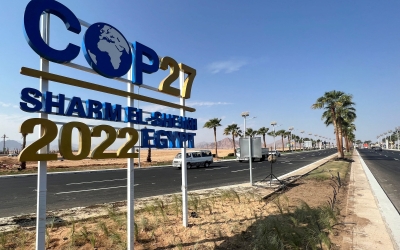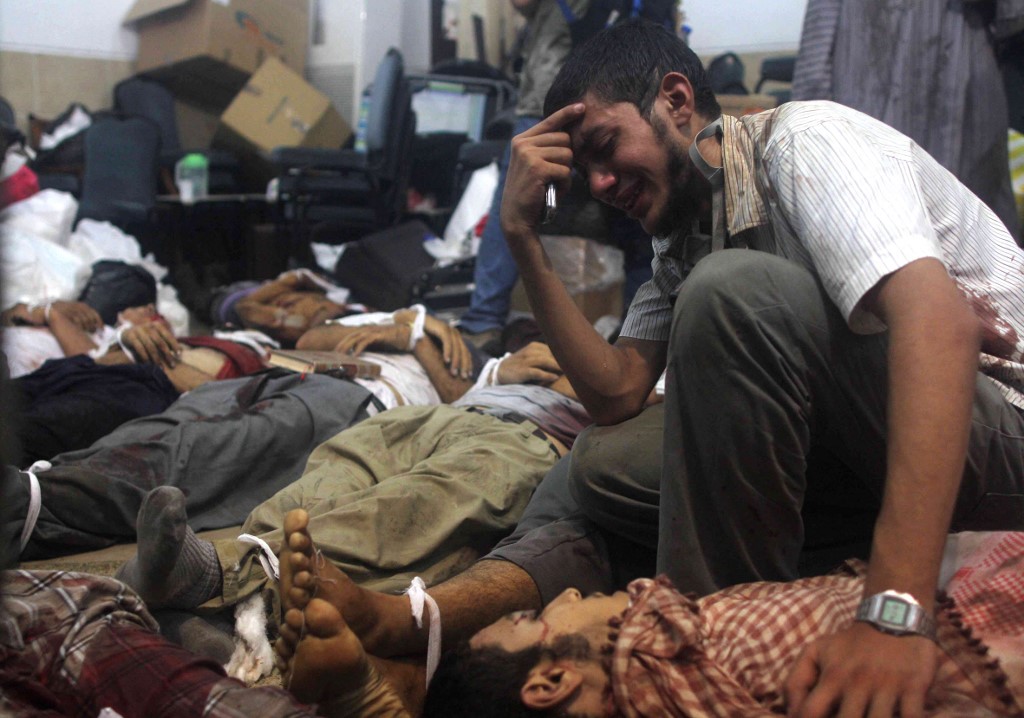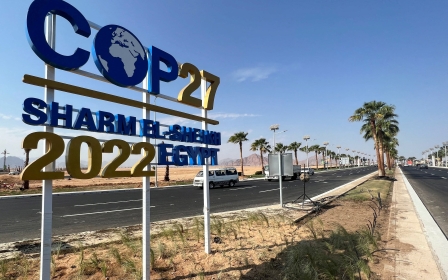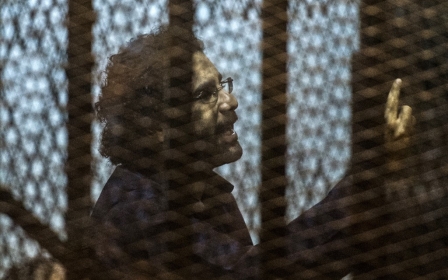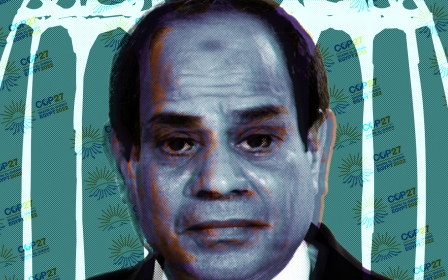Cop27: Why Sisi fears protests during UN climate gathering in Egypt
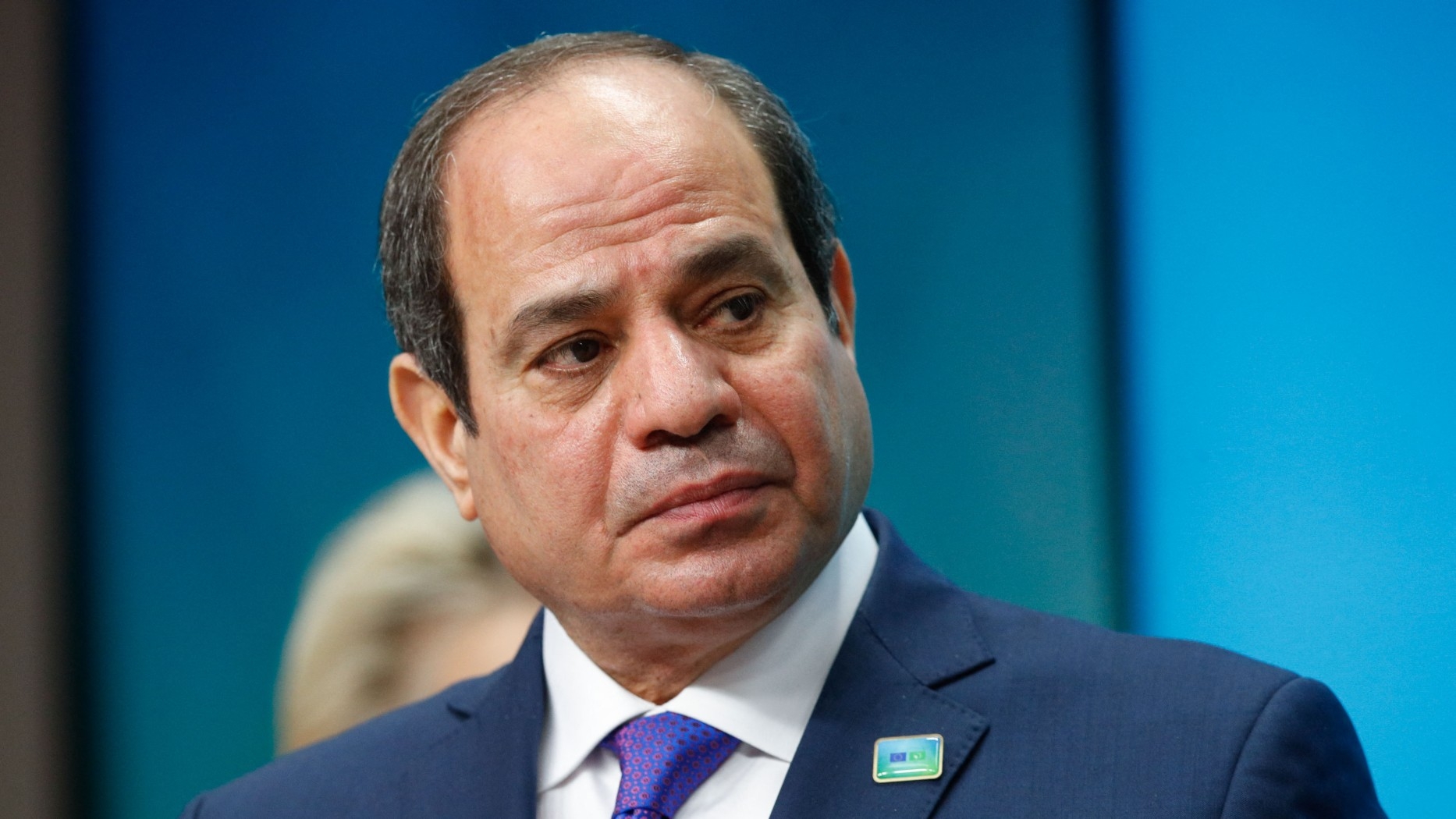
If last week’s public speaking blitzes were any indication, Egyptian President Abdel Fattah el-Sisi is nervous about the calls for nationwide protests on Friday 11 November.
The protests are set to coincide with the 2022 United Nations Climate Change Conference, scheduled for 6-18 November in Sharm el-Sheikh. Although the Sisi regime has crushed past demonstrations and criminalises public dissent, the organisers of this month's protest believe the use of force is unlikely during an international conference.
Last week, Sisi spent more than four hours addressing Egyptians over the course of the 2022 Egypt Economic Conference, which was held between 23-25 October. There, he delivered two mostly off-the-cuff speeches - the first lasting one hour, while the second went on for two.
'Shall I bear these words of critique? Or shall I bear our poor conditions?… Or shall I bear our abject poverty? Or what?'
– Sisi in a recent TV interview
The speeches were disjointed, with Sisi oscillating between expressions of defensiveness and blame. He defended himself against allegations that he failed to pull Egypt out of its miserable condition, but he also blamed numerous entities and events for failures he seemed to acknowledge.
Sisi further surprised Egyptians after the conference by calling in to a late-night television news show airing on Channel 1. Presenter Yousef al-Husseiny interviewed him for 80 minutes.
New MEE newsletter: Jerusalem Dispatch
Sign up to get the latest insights and analysis on Israel-Palestine, alongside Turkey Unpacked and other MEE newsletters
Ahead of the UN gathering, Sisi's speeches and interviews suggest a high level of anxiety. The variety of messages he communicated further indicate that they were driven by multiple objectives, the most important being to shut down criticisms about economic policy, warn against future protests, and recast himself as a heroic, pious figure.
Shutting down criticism
In his recent speeches and aforementioned interview, Sisi's most obvious objective was to respond to recent criticisms, many of which centre on the economy. After carrying out the 2013 coup, he had constructed a near-authoritarian media system. As economic conditions in the country deteriorated, however, cracks in the media system began to emerge.
Although Sisi is still treated with reverence, Egyptian news shows now occasionally question the direction of the economy. If last week’s display is any indication, Sisi has been shaken by critiques. During the television call-in, he said "the words [of criticism] being spoken [about me] are very upsetting".
At one point, the presenter, Husseiny, interjected, assuring Sisi that people are speaking out “because they have confidence in [his] ability to bear them”. But Sisi interrupted him again, indicating he could not bear Egypt’s difficult socioeconomic realities and public criticism.
He said, "Shall I bear these words of critique? Or shall I bear our poor conditions?… Or shall I bear our abject poverty? Or what?" And Sisi specifically addressed allegations that he isn’t doing enough to care for the nation’s poor, exclaiming, "this is dangerous talk".
Later in the interview, Husseiny again intervened, requesting Sisi "overlook" unfounded criticisms. Sisi responded, "Even more than I already have?" Later, he raised his voice angrily, despite Husseiny’s friendly tone.
In his second speech, Sisi argued that the media aren’t doing enough to help the government limit the number of Egyptian children born annually, nor to ensure Egyptians have proper expectations about the economy. He said media should communicate to Egyptians that "goals… are difficult to achieve right now” due to “limited resources".
A warning against protest
A second apparent purpose of Sisi’s remarks was to warn against protests. This purpose is closely linked with the first - for Sisi, criticisms could inspire people to revolt - and also an indication he is worried about calls for 11 November protests. Sisi lamented Egypt’s 2011 democratic uprising and the demonstrations of 2013. He claimed the events of 2011 and 2013 cost Egypt “$477bn”, and argued that the “events of 2011 and 2013 would bring any nation to its knees”.
He made it clear that Egypt cannot afford protests. During his television call-in, Sisi asked angrily, “What is this? Again? Are you people a hopeless case?”
At several points during the show, Sisi indicated Egypt couldn’t even afford critique. “Egypt, in its current situation, cannot afford [criticism]… [the nation] cannot bear this right now,” he said. In other remarks, he associated the events of 2011 and 2013 with disaster: "Isn’t it enough what happened to the country?... You left the country until it was burned down and destroyed."
Sisi also acknowledged to Husseiny that he is afraid: “This path scares me… I am scared… I am scared for the nation… the experience we had [in 2011 and 2013] was very difficult and should never be repeated.”
A hero 'guided by god'
Sisi also used last week’s addresses to recast himself as a hero connected to God. He explained how much he understands about reality, particularly in comparison with others.
In the first speech, Sisi said Egyptian politicians "lack understanding". In the second speech, he said the Muslim Brotherhood needed to be forcibly removed from office in 2013 because they didn’t "understand".
Addressing critics who oppose his $60bn administrative capital, Sisi said, "you do not understand what 'nation' means", adding that a difference in opinion is acceptable, but "a difference in understanding is a problem". Sisi also criticised past Egyptian regimes, and belittled proposed solutions presented during the economic conference.
Frequently, Sisi implied his understanding of the Egyptian state was provided by God. During the interview, he asked Husseiny if he could "say something difficult"? Without giving his host a chance to respond, Sisi said, "I am none of your business. You don’t know what I am doing."
When Husseiny responded by saying "we understand", Sisi said, "No… you don’t know. Only one knows. Our Lord… The one who knows, and who helps me… is our Lord."
At one point during the second speech, Sisi said people often ask him why he talks about God. He said, "Because He is my darling, and He is precious to me." He then recited a short Quranic verse, "So [God] made Solomon understand it." The meaning was clear: Sisi has been made by God to understand.
During the second speech, Sisi also referred to himself as a "hero", proclaiming that "a hero is something" more than a political leader. After reminding Egyptians that they called him a "hero" in the summer of 2013, Sisi asked, "has the hero died, or what"?
Desperate masses
Online calls for protest on 11 November have recently picked up steam, with many Egyptians posting online videos explaining why they will hit the streets.
It remains to be seen whether Egyptians will contravene the protest law and risk regime violence and arrest
The regime is fearful, reportedly employing draconian security measures. It remains to be seen whether Egyptians will contravene the protest law and risk regime violence and arrest.
In 2013, Sisi massacred hundreds of protesters and arrested tens of thousands. Egyptians remember the regime violence, so the extent to which they are willing to risk their own safety may depend on how desperate they are.
If Sisi’s own acknowledgments are any indication, many Egyptians may just be desperate enough.
The views expressed in this article belong to the author and do not necessarily reflect the editorial policy of Middle East Eye.
Middle East Eye delivers independent and unrivalled coverage and analysis of the Middle East, North Africa and beyond. To learn more about republishing this content and the associated fees, please fill out this form. More about MEE can be found here.



